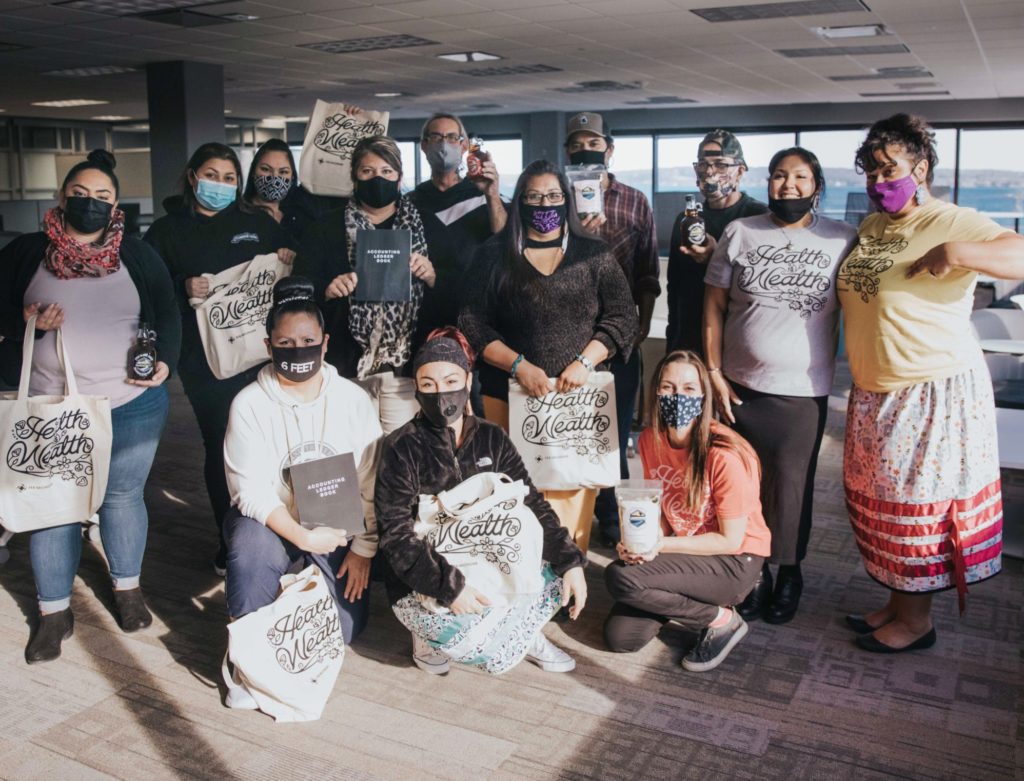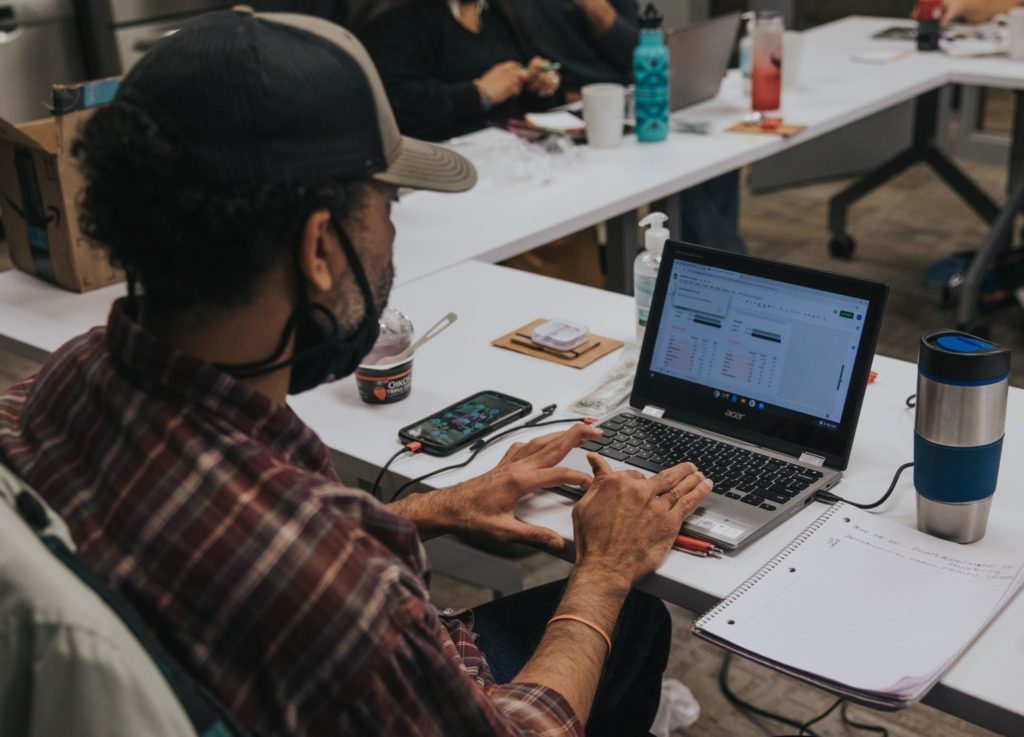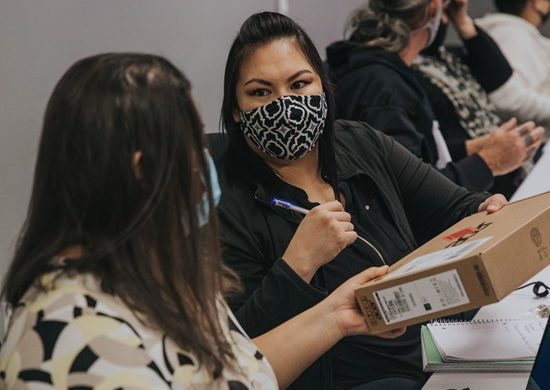December 18, 2020 - 8:23 am
Arrowhead Incubator Provides Culturally-connected Business Training for Michigan’s Native American Entrepreneurs
Robin Kissinger is an artist, a writer, and a Native American entrepreneur in St. Ignace, Michigan. He has recently opened an art gallery and studio, and hopes that with his business’ success, he will not only support his family, but also his larger community.
“My business is not just about having a place for people to sell their work,” said Robin. “It helps the elders in our community and it’s a place for young Natives to come and learn.”
After recently completing the Financial and Business Basics program hosted by Arrowhead Incubator in Traverse City, Robin has new business skills to help make his dream a reality.

Empowering Michigan’s Native American Entrepreneurs
Financial and Business Basics (FBB) is a New Mexico Community Capital program that provides foundational business courses to Native American entrepreneurs using innovative, and culturally-connected, methods. Arrowhead Incubator, a 20Fathoms member and Traverse City nonprofit that works to advance Native American small businesses, partnered with New Mexico Community Capital to bring the program to Michigan.
The Michigan program was facilitated by three Native American women: Shiloh Slomsky, Executive Director of Arrowhead Incubator; Nicole Raphael, a veteran and member of the Grand Traverse Band of Ottawa and Chippewa Indians; and Sarah Brant, a member of the Munsee-Delaware First Nation of Canada.
For Robin, the unique perspectives offered by the facilitators was a valuable component of the program. “I enjoyed the Native American perspective,” he said. “The facilitators were all Native American, all women, and all moms. They have all been through their own journeys and that added legitimacy and dimension.”
Shiloh, Sarah, and Nicole have held three cohorts of FBB – two in Grand Rapids and one at the 20Fathoms office in Traverse City – and 25 tribal community members have now completed the program. They learned how to write a business plan, apply for a loan, price their products, budget, and much more.
“This program will help me a ton,” said Robin. “I will continue to gain knowledge from the tutorials and hands-on help. We learned that the cultural knowledge that we have counts, but there’s so much more to learn in order to successfully run a business.”

Business Courses with a Twist: Empathy, Innovation, and Culture
The FBB program is unique in the wrap-around support provided that helps remove barriers to participation and success in the program. Participants received childcare assistance, travel accommodations, a laptop computer, and startup business funding. Food was also provided; feasting and sharing meals is a vital practice of tribal communities.
“The team at New Mexico Community Capital went above and beyond when creating this program,” said Shiloh. “The childcare aspect was just one critical component. A lot of our participants have young children and by providing childcare support, many people were able to take advantage of this program who wouldn’t have normally been able to do so.”

Similarly, Arrowhead Incubator places a high priority on meeting their clients where they are – not where they are supposed to be – and provide individualized support customized to meet each participant’s need. Robin appreciated this communal, supportive atmosphere. “This training was a little different than the more corporate trainings,” Robin said. “There was an open atmosphere and they made us feel at ease so that we had a safe space to think about what we wanted to do with our businesses. What kind of positive impact do we want to leave on the world? How can we express that? How do we bring an idea to life? How do we make money and sustain it? It was invaluable.”
Shiloh believes that the blend of business and culture is critical. “There is something that touches deeply when one is able to stand beside two other amazing females and teach in a way where you can highlight just how entrepreneurial our cultures are and see the lightbulbs begin to flare,” she said. “For example, we are taught from a young age not to waste that which we take. This is at the heart of innovation, for we had to learn ways to utilize all of something. This showcases how business and entrepreneurism resides deeply in our cultures and way of life.”
The Disproportionate Impact of COVID-19 on Tribal Communities
The program resonated particularly deeply this year, as many tribal communities have been hit especially hard by COVID. With their economies heavily focused on casinos, arts, and tourism, the COVID-19 pandemic has decimated Native American’s revenue. According to MiBiz, Michigan-based tribes’ decisions to close their casinos for eight weeks or more starting in March of this year has cost them upwards of $200 million. That’s money that 12 sovereign tribal nations will not be able to then disburse to their communities and their businesses.
Add to this that many Native Americans lack or have limited access to technological resources, the FBB program lifts the veil and brings light to how tribal communities can begin to navigate forward in the coming months and diversify their economic development at the ground level.
“At Arrowhead Incubator, we’re working to rapidly address the economic downdraft by stimulating small business creation which brings revenue, jobs, and resilience onto our reservations and our regional economy,” said Shiloh. “The keys to social and economic development for current and future generations are collaboration and community, and that’s why partnerships like this with New Mexico Community Capital are so impactful.”
Robin is hopeful about the future. “I’ve always been a writer and an artist, but it’s a big jump to get to the next level and create a successful business,” he said. “This program is helping me build on what I’ve started.”
